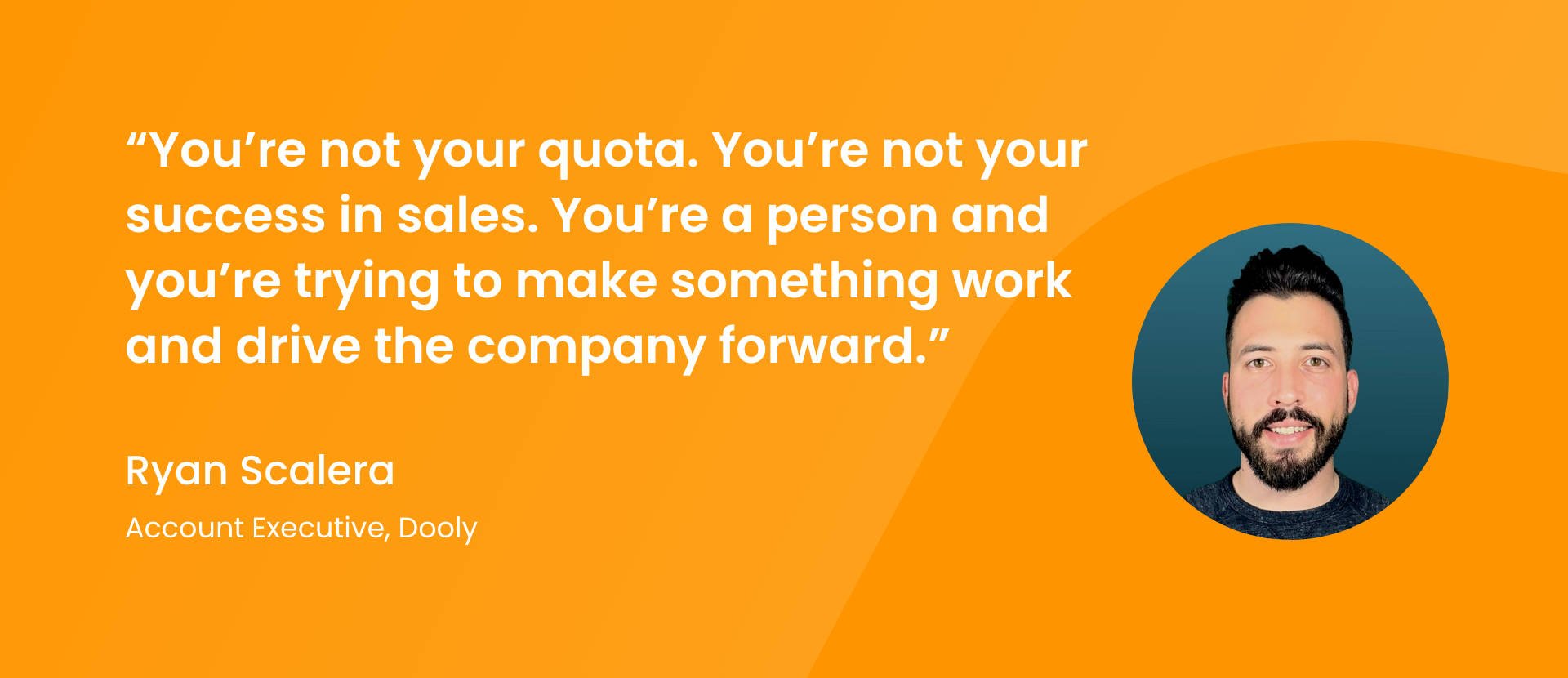Did you know that more than 40% of sales professionals struggle with mental health issues? Yet talking about it is often seen as a sign of weakness.
Life in sales sure can feel like a constant rollercoaster ride. One day you’re on top of the world after smashing your quota. The next day you might feel crushed and disheartened after losing a prospect you’ve been chasing for months. This takes a toll on your health.
The personal and business costs of ignoring mental health are staggering. And the only way to avoid a breakdown is to prevent it, which is easier said than done.
But ultimately, you’re the one who’s responsible for making sure that you take time to care for yourself, and improving your mental (and physical!) health should be one of your top priorities.

You’re not your quota: SDRs and stress
Charlotte Johnson (Account Executive, Salesloft) used to hate being an SDR.
She’s a competitive person, and she struggled not to be stressed. She had to hit all of her targets, which resulted in a downward spiral of stress.
But at the end of the day, it doesn’t matter if you don’t hit target.
It’s just a number! Yes, you do want to hit it, but you shouldn’t kill yourself over hitting it.
Just acknowledge that it happened and try to figure out why you didn’t perform well enough. Did you miss something? What did you do differently this month compared to a more successful month? And what can you do next month to not be in the same situation?
You can’t control everything, and you’re dealing with humans every day.
You have no way of knowing if they have an emergency coming up and they have to reschedule a meeting for next month, hurting your quota by doing so.
Focus on what you can control, and don’t forget to have fun while you’re doing it!

Work smarter, not harder
Laura Leap (Senior Account Executive, Samsara) swears on preparation being the most crucial part of the job — working smarter, not harder.
She advises that you should always be working a quarter ahead if you work in quarters. You’re already behind if you’re getting ready for the quarter at the beginning of the same quarter.
You could probably hit quota in the first month, so you can save some time and headspace for building pipeline generation for the next quarter, as well as you can keep health savings to feel secure while working.
Following this process, you’re not just starting the quarter on the very first day. You already started it a month ago.
You’ll have deals about to close in the first weeks, which will help you get your quota faster and end up at 200-300% over the finish line.
Tips and tricks
Maintaining a healthy work-life balance is crucial for sales professionals.
However, according to HubSpot’s research, one-third of salespeople say they have no work-life balance at all, and more than two-thirds describe their lifestyle as challenging.
While you might accept a chaotic lifestyle as part of your job, it shouldn’t be that way.
Success often comes from understanding your priorities and setting boundaries and expectations.
The good news is that there are concrete steps you can take to start working on that balance already today!

1. Set limits for yourself
When Charlotte started working as an SDR, she would get into the office around 6:30 a.m. and not leave until 7-8 p.m. She would never take breaks, stress constantly, and never focus on her mental health = quick burnout!
Nowadays, she starts working around 7:30 a.m., makes sure that she takes a lunch break, and she’s strict about shutting off around 5:30 p.m. every day unless there’s something urgent to be done.
2. Take small breaks
Working from home offers a lot of flexibility, but it also requires that you know how to make the best use of that freedom.
If you live alone, there’s no one to disturb you, so you mustn’t forget to get away from your usual or standing desk during the day. James Ski’s (CEO and Founder, Sales Confidence) best tip is just to step outside and get some fresh air.
If you’re super stressed out, Ryan Scalera (Account Executive, Dooly) suggests that sometimes it’s worth taking the day off and getting entirely away from it all than staying up and sending 40 more emails or calling your prospect 30 more times.
Getting some physical and mental distance from your problems will allow you to return with a focused and positive attitude.
3. Disconnect
Taking time to not look at your phone or your emails, and not think about sales can be life-changing.
Just really experiencing life and getting away for a day or two and not thinking about anything work-related can make a big difference in your mental health.
Monika Ratniece (Senior Account Executive, Linnworks) enjoys working out, reading, and listening to podcasts. She recommends finding something that will positively impact your life and help you recharge. Whether reading a book or sitting in a bath and putting a face mask on, you need to carve out time for yourself.
If you’re not in a positive mental state, you’re not performing well. Customers can sense that you’re not in a good place if you’re not optimistic. Therefore, you need to find ways to disconnect and recharge.
4. Focus on eating healthy
Moeed Amin (Founder & CEO, Proverbial Door) points out that most people don’t understand the gut-brain connection. Science has shown that a healthy diet may have a serious impact on mental health, so there’s truth in the saying “you are what you eat.”
Many salespeople live incredibly unhealthy lives and are surprised that they’re experiencing brain fog and not feeling that innovative and energetic. Keeping your calories at a deficit can help you lose weight and improve your general disposition, too.
Sales is an intense sport, so paying attention to the food-mood connection is recommended!
5. Move that body!
Research also shows that people who exercise regularly have better mental health and emotional well-being. Exercise can reduce stress and anxiety and even increase your self-esteem, which is not a small feat for someone in sales.
Even though most people would rather do literally anything else but wake up early and exercise in the morning, the effort is worth it.
Ryan discovered the importance of exercise quite late in his life, at the age of 23. That’s when he decided to hit the gym and never looked back since.
6. Celebrate small wins
James suggests that one of the most important ways to get a sense of satisfaction and reduce your stress as a sales professional is to celebrate small wins.
If you’re always waiting for the next big deal, keeping up a positive attitude will be challenging. But if you can celebrate small things that went well on a daily basis, you’ll feel way more satisfied. A small win can be someone responding to your email, even if you got a negative response. The silver lining is that you got an answer, at least!
Focusing on positive happenings is a form of practicing gratitude. And gratitude can make you happier, and healthier, and it can help you reach your goals.




